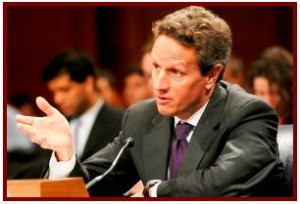
In a matter of just three months, five trillion dollars of Americans' household wealth evaporated during the waning months of the Bush Administration. Economic activity and trade around the world ground toward a halt.
U.S. Treasury Secretary Tim Geithner was at the Detroit Economic Club yesterday giving a speech that is a preview of the issues that will arise in the presidential election next year – challenges to U.S. economic growth, financial repair and reform, and fiscal sustainability.
But not before he did a commercial for President Obama’s controversial auto bailout of the U.S. auto industry that happened when the new administration forced Chrysler and General Motors into bankruptcy in 2009 and then used borrowed U.S. taxpayer money to reorganize the companies and save the U.S. auto industry.
“For the first time since 2004, all three American automakers have an operating profit. And since GM and Chrysler emerged from bankruptcy in June 2009, the industry has added nearly 90,000 jobs—the strongest period of job growth in more than 10 years,” Geithner said.
This defense of the auto bailout – it could have been worse is implied – came just after the federal government announced that the U.S. economy grew at a slower-than-expected 1.8% rate in the first quarter, and initial claims for state unemployment benefits jumped 25,000 to a seasonally adjusted 429,000, which means we are losing not creating jobs.
“This is still a very tough economy for millions of Americans—including so many families here in Michigan—because of the aftershocks of this crisis, Geithner said. “Millions of Americans are still looking for work and at risk of losing their homes. Construction is still very weak. It will take several more years to repair the housing market. Higher gas prices are putting more pressure on the average working family. And the damage is much more severe than the national averages capture in so many communities across the country.”
The auto bailouts remain deeply unpopular among ideologues who maintain that the “Government Motors” should never have come about, while ducking the very real issue that the entire U.S. industry was at stake not just two companies due to the complexities of the supply chain – as the auto industry is coming to understand to the supply disruptions because of the Japanese earthquake.
Geithner, whose visit was clearly timed to coincide with Chrysler’s earlier announcement that it would issue debt and borrow money to pay back its government loans, corrected the record.
“Two years ago, no one would have expected us to be in this position today,” Geithner said,” and it shows the success of the strategy the President implemented and the skill and dedication of Chrysler’s employees. We are looking forward to the full repayment of our loan to the company.” Geithner also said that the government is in the process of getting completely out of the auto business – presumably before the election – even if it means losing money in the process. (See Chrysler to Repay Loans with New Debt. Fiat to Up Stake to 46%. Credit Ratings under Review for Possible Downgrade?)

